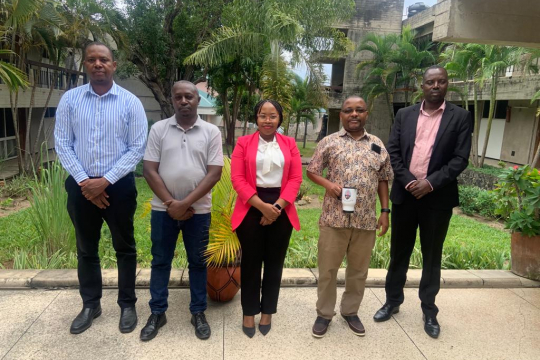The participants in the Inclusive Green Economy Program (IGE) in practice program, the IGE fellows, met the senior researchers and the support team to discuss and forge a common understanding of the IGE program. The focus of the dialogue was on “transformation initiatives” for the year 2023/24. The Transformation Initiative is a key component of the IGE program, intended to support IGE Fellows to take concrete actions for transformation within this year’s theme, “Sustainable Energy Transitions”.
The working session involved discussions focusing on the transformation initiatives to switch from biomass dependency to clean cooking energy in Tanzania. The aim is to unpack some of the policy-oriented challenges and accelerate this transition.
IGE fellows from three ministries participated
The working session was held on August 10-11, 2023. The fellows are Haika Mgonja, and Innocent Goodluck economists from the Department of Policy Analysis in the Ministry of Finance; Shukrani G. Rugaimukamu, Energy Engineer and Fredrick Marwa a Geologist from the Electricity Development Department in the Ministry of Energy; and Mary Mahumi an Economist from the Tanzania Forest Service Agency (TFS) -Department of Marketing and Planning in the Ministry of Natural Resources and Tourism.
From EfD Tanzania participated senior researchers Dr. Aloyce Heplwa and Dr. Remidius Ruhinduka as well as EfD Tanzania’s newly recruited IGE Policy engagement specialist Dr. Wilhelm Ngasamiaku.
Why focus on a sustainable energy transition?
Aloyce Hepelwa explained that the basis for this year’s theme is that it’s one of the key national priority areas in the energy sector by the current government. These challenges have also been highly echoed and in various national reports and strategies such as Tanzanians’ 2023 Voluntary National Review (VNR) report on Sustainable Development Goals (SDGs), the Rural Energy Master Plan (REMP) 2022/23 to 2029/30 and Tanzania’s 2021 Nationally determined contributions report.
The objective of the thematic area for 2023/24 is to explore the challenges of a sustainable energy transition to address the core problems and identify potential opportunities for inclusive growth.
The IGE fellows will be working closely with the academic to draw relevant knowledge and experience to feed into the policy-making process. The IGE program will enable policymakers to coordinate the planning and budgeting processes through budget tagging. For instance, Aloyce Hepelwa noted that specific policies, programs, and projects could integrate the IGE concept in the Fourth Medium Term Plan 2023-2027 (MTP IV) preparation process and the envisaged National Vision 2050.
Aligns with several reports and plans
Tanzania has launched Sustainable Energy Transformation Initiatives based on various reports such as Tanzania’s 2021 Nationally Determined Contributions (NDC) report with a focus on promoting clean technologies, reducing the consumption of charcoal in urban and rural areas by promoting affordable alternative energy sources, and to promote climate-smart rural electrification, including the development of micro and mini-grids. Furthermore, Tanzania has put in place a Rural Energy Master Plan (REMP) for 2022/23 to 2029/30 to address issues of rural electricity with a clear clean cooking action plan. However, the team learned that there is a need to systematically examine the Tanzania 2023 Voluntary National Review (VNR) report to identify potential transformative initiatives in line with our thematic theme. To this end, it was emphasized that from these reports, the team tries to identify gaps and challenges to be empirically examined to identify possible solutions for a sustainable energy transition in Tanzania and thereby inform policy-making in the energy sector accordingly.
By Salvatory Macha
